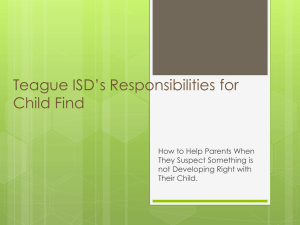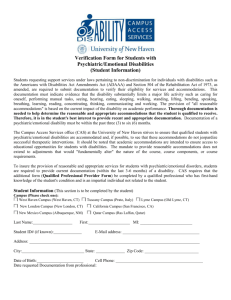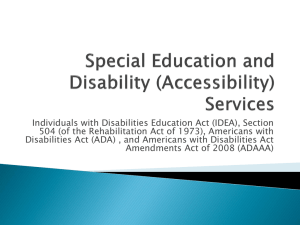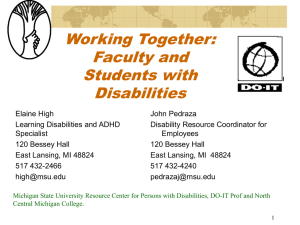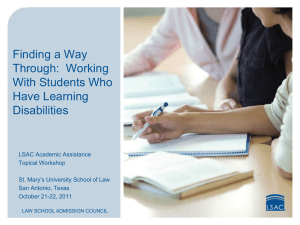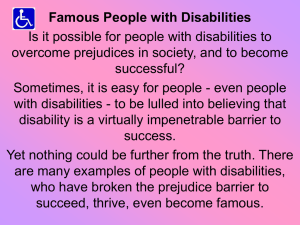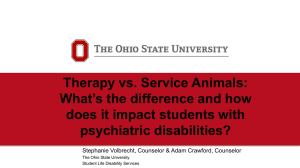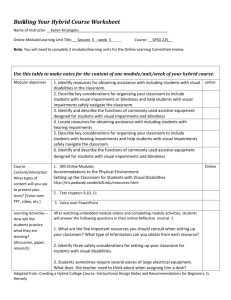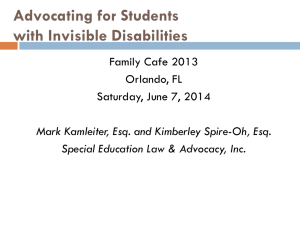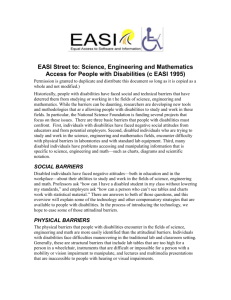Disability Services - University Advisors and Counselors
advertisement
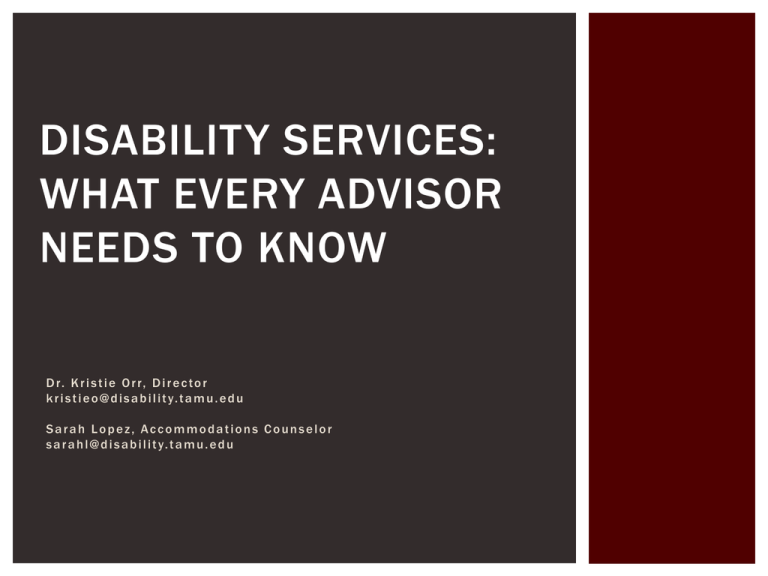
DISABILITY SERVICES: WHAT EVERY ADVISOR NEEDS TO KNOW D r. K r i s t i e O r r, D i r e c t o r k r i s t i e o @ d i s a b i l i t y. t a m u . e d u Sarah Lopez, Accommodations Counselor s a r a h l @ d i s a b i l i t y. t a m u . e d u LEARNING OUTCOMES Participants will be able to identify basic functions of the Department of Disability Services. Participants will understand academic issues impacting students with disabilities. MISSION Disability Services promotes an inclusive environment at Texas A&M University by facilitating appropriate accommodations, empowering students to be self -advocates, and educating the campus community. Disability Services staf f members interact and collaborate with students, faculty and staf f, and provide appropriate referrals to achieve equal access for students with disabilities. EXAMPLES OF DISABILITIES Learning Disabilities Attention Deficit Hyperactivity Disorder Psychiatric Disorders Health Impairments Visual Impairments/Blind Orthopedic Impairments Traumatic Brain Injury Speech Impairments Autism Spectrum Disorders STUDENTS REGISTERED WITH DS Attention Deficit Hyperactivity Disorder Learning Disabilities Psychiatric Disorders Health Impairments Visual Impairments/Blind Hearing Impairments/Deaf Or thopedic Impairments Traumatic Brain Injur y Temporar y Disabling Conditions Autism Speech Impairments Deaf/Blind Total Students with Disabilities Fall 2011 522 484 287 177 61 44 48 29 20 17 11 1 *1059 (* Note some students have more than one diagnosis) Spring 201 2 573 472 302 1 89 49 46 52 26 22 17 14 0 *1108 STUDENTS WE SERVE Students from every college including Health Science Center Every facet of student life is represented: Corps of Cadets, Student- Athletes, Greeks, International Students, Honor Students, and Undergraduates and Graduates Students with lifelong disabilities, acquired disabilities, and temporary disabilities SERVICES Testing Accommodations Extended time Reduced distraction testing environment Readers Scribes Use of a computer and/or specialized hardware/software Classroom Accommodations Note-taking assistance Recording lectures FM System (assistive listening system) Preferential seating (at the front or back of classroom) SERVICES Adaptive Technology Services (ATS) Adaptive hardware and software in DS Adaptive Technology (AT) assessments Alternative format production and scanning Ensuring access in campus computer labs (Open Access labs and department labs) Consulting on website accessibility Sign Language Interpreting/Transcription Classroom interpreting/transcription Interpreting/transcription also provided for S.I. sessions, field trips, internships, study abroad Consultation for other entities needing an interpreter/transcriptionist (e.g., Student Health Services, academic conferences & workshops, employee, etc.) SERVICES Accessibility Housing (consult with Residence Life) Consultation on accessibility of classrooms, offices, programs, etc. Braille signage for buildings ADA Compliance Committee (represent student needs) TIPS FOR ADVISING STUDENTS WITH DISABILITIES Disability information is strictly confidential It is okay to ask general questions if the student discloses their disability to you. Are they working with DS? If not, make a referral and follow -up. Do they have difficulty with reading, writing or math Limit the number of heavy reading, math, or science classes during a semester Serious psychiatric issues should be referred to Student Counseling Services Returning Veterans may be more reluctant to register with Disability Services Refer to Veteran Resource and Support Center TIPS FOR ADVISING STUDENTS WITH DISABILITIES Become familiar with the dif ficulties imposed by a particular disability: If the student is taking medication, are there certain times of the day when the student is less alert? This could have important implications when developing a class schedule. Be aware of the campus: Awareness of the campus could prevent enrolling a student who uses a wheelchair in a class that can only be accessed by a stairway. Depending upon the amount of time allowed to pass from one class to another, any student with a mobility issue might have difficulty with classes scheduled back to back in different buildings. TIPS FOR ADVISING STUDENTS WITH DISABILITIES Know the rules and regulations of Texas A&M University: Financial aid and course substitutions are two examples of areas that can be used to a student's advantage. As well as early registration. A student with a disability can receive some forms of financial aid even though the student is enrolled in less than twelve hours, if their disability warrants it. Other students may qualify for a course substitution. Advisors need to know the procedures on their campus for such things as obtaining a course substitution if they hope to assist students who qualify. Develop a collaborative relationship with the Department of Disability Services (DS): DS is responsible for establishing eligibility for accommodations, determining the nature of the accommodations needed by a particular student and helping to insure that the student receives the accommodations for which they are eligible. QUESTIONS?
